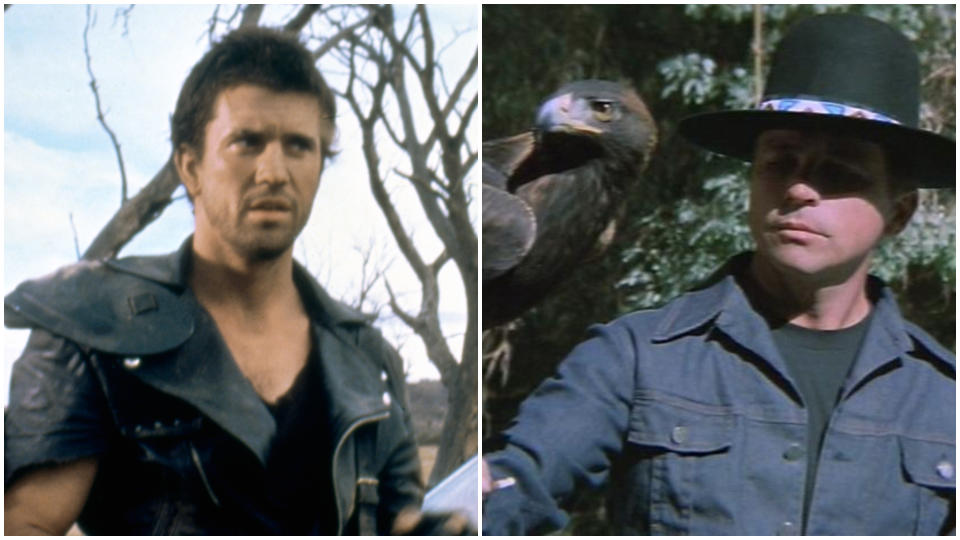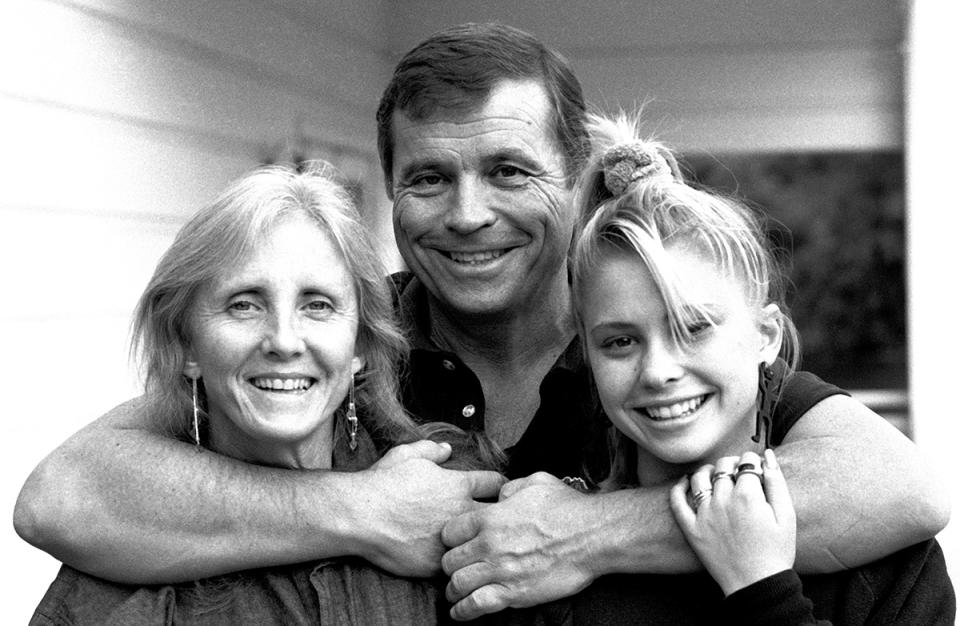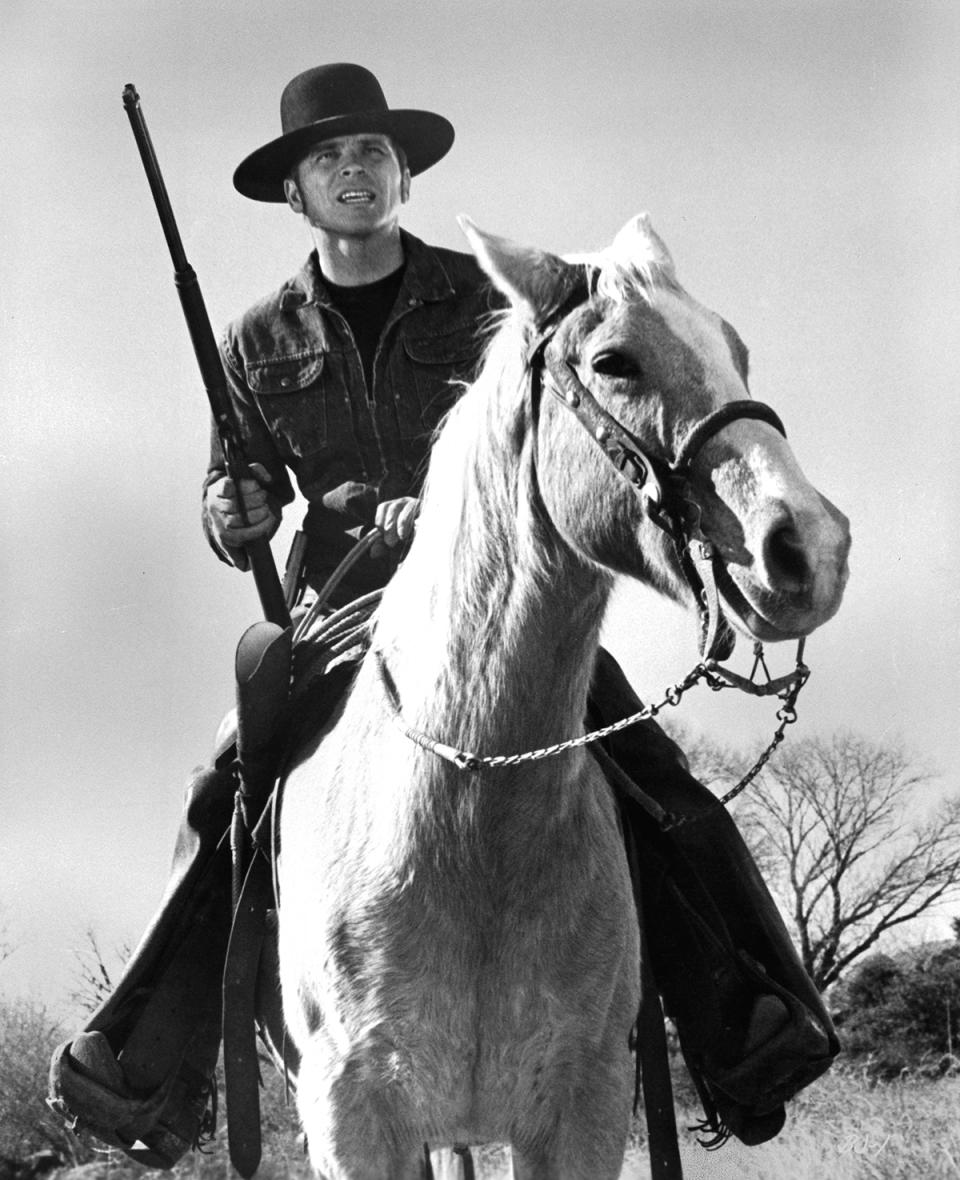Billy Jack: Tom Laughlin's 70s Hollywood Anti-Hero | First For Women
- Oops!Something went wrong.Please try again later.
- Oops!Something went wrong.Please try again later.
- Oops!Something went wrong.Please try again later.
In the mid-to-late '60s, outlaw biker movies were all the rage, and by every expectation that existed, the debut of Billy Jack in 1967's Born Losers would hit theaters and drive-ins, make a few bucks and pretty much disappear. Unless you were 1969's Easy Rider, that's usually the way these things would go. But apparently what this film had that none of the others did was the Billy Jack character as played by actor Tom Laughlin.
Billy Jack as a whole was a pretty big deal from the time of that film's release until about the mid 1970s, preceding action heroes like Sylvester Stallone and Arnold Schwarzenegger. Something about the character connected in a big way that actually transcended the films he was featured in, because, to be honest, whether you're talking about Born Losers or its follow-ups — Billy Jack (1971), The Trial of Billy Jack (1974) or Billy Jack Goes to Washington (1977) — they're all very low budget movies with a heavily mixed message of using violence to obtain peace. And to be sure, there is a lot of violence.
"What occurs to me when thinking about the Billy Jack series," suggests film historian Ray Morton, author of, among others, Close Encounters of the Third Kind: The Making of Steven Spielberg's Classic Film, "is how similar it is in some ways to the Mad Max movies. Both start off with a low budget exploitation movie featuring a lead character who is a bit generic, but played by an actor — in Max's case by Mel Gibson — with undeniable screen presence. And then, as each series progresses, they move away from being exploitation pictures and become more and more epic. The budgets and the movies get bigger and the lead characters become more developed and more mythologized, while the lead actors' performances become more and more stoic."

L-R: Getty Images; ©Taylor-Laughlin Productions/courtesy MovieStillsDB.com
Billy Jack, the half-Native American Green Beret Vietnam vet, was the brainchild of actor/writer/director Tom Laughlin, who was born on August 10, 1931 in Milwaukee, Wisconsin. The concept for the character actually came to him in 1954 after he'd met future wife, co-writer and co-star Delores Taylor. The official Billy Jack site describes things this way:
"Tom and Delores met in college. He was a football star, she was — naturally — a cheerleader. Tom was from the comparative metropolis of Milwaukee, Wisconsin, Delores was from Winner, South Dakota. Tom went to visit Delores during winter break 1953 and was exposed to the shock of his life.

Bob Riha, Jr./Getty Images
"Winner," it continues, "is the heart of Indian country. Pine Ridge and Rosebud Indian reservations are neighbors. The main street of Winner, only partially paved, ended at a place the locals called Indian Town. A collection of Indians huddled in the sweltering heat of summer and deadly freeze of winters hoping for odd jobs or help from the locals. Tom couldn't believe what he was seeing. He'd never imagine that human beings could be treated this way. And he vowed there and then to make a difference."
That was the seed that launched Billy Jack. Flash forward 13 years and you get Born Losers.
Born Losers (1967)
Says IMDBpro of the plot, "A malicious motorcycle gang harasses the residents of a small California town, intimidating most residents to not report them to the police. Among the gang's crimes is the rape of four young women. As the gang attempts to threaten the women into not testifying at the indictment hearing, one of the women, Vicki, comes under the protection of Billy Jack, who has also had several altercations with the gang. The gang escalates their pressure on both Vicki and Billy Jack to keep her out of the courtroom."
What was probably most unexpected was the fact that Born Losers, made for a budget of between $300,000 and $500,000, saw a box office return over several releases of approximately $36 million — which was huge at the time.
Billy Jack (1971)
In the second film of the series, students at the hippie-themed Freedom School, led by Jean Roberts (Delores Taylor), are abused by the local townspeople. Into this situation steps Billy Jack, who has to fight his way through the abusers to convince them to leave the students alone. Things take a darker turn when the town's biggest punk, Bernard Posner (David Roya), son of the town's most powerful man, rapes Jean and Billy Jack sets out to remove this threat. In between all of this, Billy goes on a vision quest to get closer to his Native American half.

Michael Ochs Archives/Getty Images
Laughlin pushed back on the people who criticized the violence for peace message of the film. "They're dead wrong," he said in an interview with Joe Bob Briggs. "The point is that what I was interested in is those angry young men in America that come from every neighborhood, and especially in the deprived neighborhoods, who feel being tough or macho is the only way to be a man. And if Billy Jack was a wimp, he would never appeal to them. The whole key to it was to have them identify with a guy who was the super stud of them all. Someone that would make them say, 'Wow, if I could be as tough as him...'"
"Billy Jack clearly had something that caught the zeitgeist — was it the hippies vs. the straights? Counter-culture vs. the establishment?" asks Morton rhetorically. "The lone hero standing up for what's right and fighting back against the crap of society? I doubt it's a coincidence that Billy Jack and Death Wish were popular in roughly the same time frame, since they touch on similar themes, while coming at them from wildly different directions. I'm not sure exactly, but whatever it was, the movie clearly clicked with audiences in a big way. Laughlin and the movie's self-seriousness always struck me more as funny than something meaningful, but that's me."
Laughlin certainly deserves credit for one thing: he took over distribution for this independent film that would go on to gross $98 million. Additionally, he brought martial arts to the big screen ahead of Bruce Lee and the entire Kung Fu craze of the 1970s.
The Trial of Billy Jack (1974)
While Billy Jack is sentenced to four years in prison for the "involuntary manslaughter" of Bernard from the previous film, Jean's Freedom School grows and starts its own newspaper and television station, which they use to expose local government corruption. By the time Billy Jack gets out of prison, the situation has gotten tense with officials willing to do anything they have to, to shut the school down. While Billy undergoes further Vision Quests, things escalate when the National Guard is brought in, which leads to an extremely violent and bloody clash.
An interesting approach was taken at the ending with the following message showing up on screen: "Some may feel this picture is too violent, but the real massacres which inspired this fictionalized version were a thousand-fold more violent for those innocent people who were its victims. Rather than direct anger at this re-creation, please channel your energy toward those officials who either ordered, condoned or failed to take action against these events, and perhaps towards ourselves for also turning our backs and letting such events occur unchallenged."
Offers Morton, "The Trial of Billy Jack is terrible, but fascinating, because it's not only self-serious, but pretentious. Laughlin was clearly smoking his own press releases with that one. Yet, like all terrible movies made by people convinced they are making a great movie, it's impossible to take your eyes off of it and the ego that drenches every frame. It reminds me a lot of Rambo III in that it's following up a predecessor that was cheaper and less well-made, but for some reason struck a spark with audiences, but the filmmakers clearly weren't sure why. The success allowed them to go much bigger the next time around without coming near to capturing whatever it was that animated the previous film."
Made for $2.5 million, The Trial of Billy Jack grossed a reported $89 million and, as things turned out, would be the last hurrah for the character.
Billy Jack Goes to Washington (1977)
When a Senator dies following the completion of an investigation of the nuclear power industry, the remaining Senator and the state's governor have to find someone to go along with their corruptive ways. They decide to use Billy Jack, who's back in prison following the previous film. The thought is that young people will follow him, helping their agenda. What they don't expect is that Billy will begin an investigation of his own that will lead him to to filibustering the Senate. In so many ways the film is a rip-off of Frank Capra and Jimmy Stewart's 1939 film Mr. Smith Goes to Washington.
"Billy Jack Goes to Washington is one of those movies that leave you scratching your head and wondering what the filmmakers were thinking," laughs Morton. "The idea of sending Billy Jack to Washington wasn't that bad, I guess, but to make it such a a direct remake of Frank Capra's Mr. Smith Goes to Washington was a mistake. Billy is Billy, but he ain't Jimmy Stewart."
And the film was mired in production and distribution problems, barely getting a theatrical release a year after it was supposed to, in 1977, and as a result losing a lot of money.
The Return of Billy Jack (1986, Unreleased)
The intended plot was that Billy Jack would take on New York City-based child pornographers, which leads him to battle the mob. This one was never released as Tom Laughlin suffered a head injury from a malfunctioning breakaway bottle. By the time he recovered, the funds he had raised independently had dried up and production shut down after only getting 15 minutes of film in the can. It should be noted, Laughlin was married to Delores Taylor until his death from a series of strokes and celiac disease on December 12, 2013 at age 82.
Observes Morton, "Whatever you think about the Billy Jack movies or about him personally, Laughlin was clearly an auteur. Whether he was a good one or not is debatable, but he was clearly a man with a vision and the will to make it real. You gotta give him credit for that."
Enjoy more entertainment stories covering the 1970s!
The Best Classic Horror Movies from the '60s, '70s and '80s Ranked
'Starsky and Hutch' TV Show Cast: See the Stars of the '70s Cop Drama Then and Now

